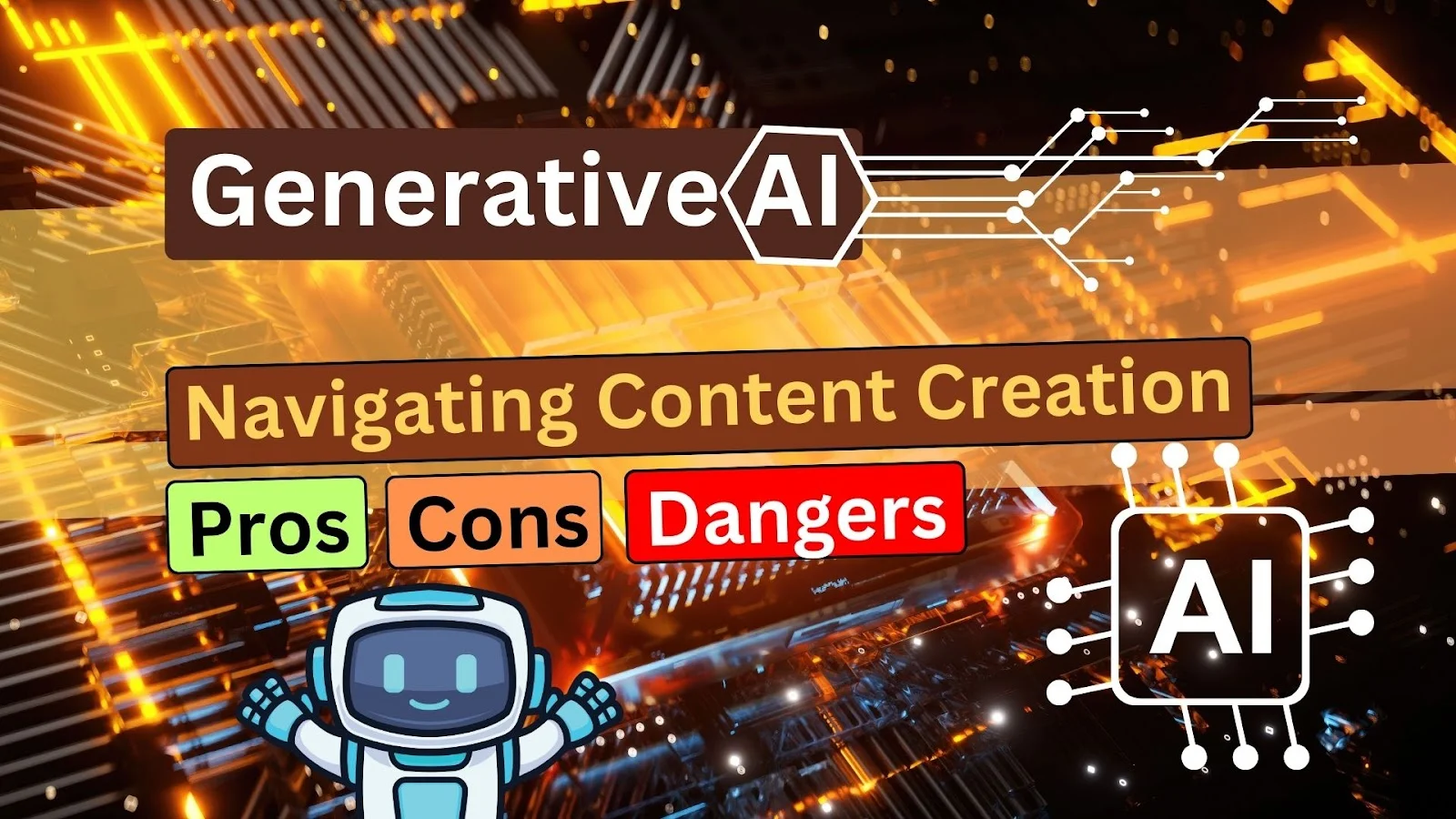Generative AI for Content Creation
Dive into the world of Generative AI: Explore its perks, pitfalls, and potential risks in revolutionizing content creation!- Article authored by Kunal Chowdhury on .
Dive into the world of Generative AI: Explore its perks, pitfalls, and potential risks in revolutionizing content creation!- Article authored by Kunal Chowdhury on .
Generative AI, a cutting-edge technology in the realm of machine learning, is transforming the landscape of content creation across various mediums. From text and images to videos, this form of AI leverages complex algorithms to generate content by learning from existing data.
In this article, we delve into the benefits, limitations, and potential risks associated with the use of generative AI for content creation.

Generative AI, a fascinating facet of machine learning, has revolutionized content creation across various mediums such as text, image, and video. By delving into data and discerning patterns, generative AI models have become adept at generating diverse forms of content, from text and images to poetry and artwork.
The intricacies lie in these models' ability to predict the next word or image based on the context provided by preceding elements. This innovation has proven particularly beneficial for marketers, offering an avenue to automate content creation processes and expedite time-to-market.
One of the remarkable capabilities of generative AI is its aptitude for content enhancement. Through analysis of data patterns and user feedback, this technology suggests valuable insights to improve existing content, ensuring it remains captivating and relevant. Moreover, generative AI serves as a formidable ally for content creation, aiding in the initial stages of drafting.
While they may not replace the ingenuity of human creativity, these tools excel in providing outlines, and one-liners, and overcoming writer's block, facilitating a smoother starting point for content creators.
Generative AI streamlines the content creation process, automating repetitive tasks and expediting the writing process. This results in increased efficiency and scalability, enabling marketers to produce a higher volume of content in less time.
AI-generated content often surpasses human-created content in terms of quality. The algorithms analyze vast amounts of data, producing well-structured and coherent content. This ensures a consistent level of quality across various pieces of content.
Generative AI assists in overcoming creative blocks by offering valuable insights and generating initial drafts. It provides outlines, one-liners, and brainstorming ideas, helping content creators kickstart their writing process and fostering creativity.
AI can suggest ways to optimize existing content, keeping it fresh and relevant. This includes analyzing and enhancing content for SEO purposes, contributing to improved visibility and reach.
While adept at generating content based on existing patterns, generative AI needs more creativity and originality inherent in human thought processes. It reproduces information from its training data and struggles to generate truly novel ideas.
AI systems may produce outputs with errors or artifacts, influenced by factors such as insufficient data, inadequate training, or the complexity of the model. This can result in inconsistencies and quality issues in the generated content.
Generative AI outputs can be challenging to control, leading to concerns about copyright, formulaic content creation, and potential issues with spam content.
The computational demands of generative AI are high, requiring significant power to generate realistic images or text. This can be a barrier due to the associated costs and time constraints.
Generative AI can perpetuate biases in the training data, potentially resulting in unfair or discriminatory content, and posing legal and reputational risks.
Understanding how generative AI models generate content can be difficult, as they lack explainability and interpretability. This can hinder the identification and resolution of potential issues.
Generative AI could be exploited by malicious actors to create deepfakes or generate misleading information, contributing to the spread of fake news and disinformation. Inadequate security measures could make AI systems vulnerable to cyberattacks.
Errors or artifacts in AI-generated content may lead to misinformation and harmful content, impacting credibility and trustworthiness.
Copyright-related issues may arise due to the formulaic nature of algorithmic content creation, raising questions about ownership of AI-generated content.
Biases present in the training data can result in unfair or discriminatory content, leading to legal and reputational consequences.
Generative AI systems consume large volumes of data, raising concerns about data privacy, governance, and potential misuse, posing risks to privacy and security.
Generative AI has the potential to produce high-quality misinformation that is emotionally appealing and challenging to detect. It can create plausible-looking yet entirely inaccurate information, contributing to the unintentional generation of fake news and disinformation. The technology may also be exploited to create deepfakes, further exacerbating the spread of misleading content.
While generative AI presents a plethora of advantages for content creation, it is essential to acknowledge and address the associated limitations and risks. Striking a balance between harnessing the capabilities of generative AI and mitigating potential pitfalls is crucial for ensuring responsible and effective use in the evolving landscape of content creation.
Thank you for visiting our website!
We value your engagement and would love to hear your thoughts. Don't forget to leave a comment below to share your feedback, opinions, or questions.
We believe in fostering an interactive and inclusive community, and your comments play a crucial role in creating that environment.